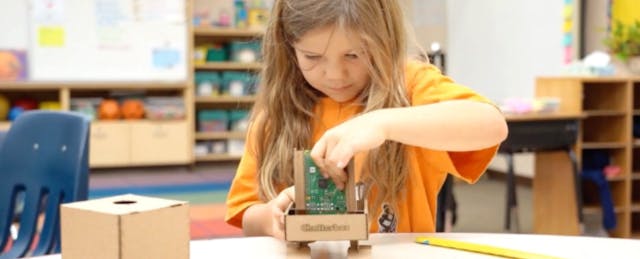Kevin Elgan believes that the best technology is the kind that gets out of the way—it doesn’t have to be on your wrist, in your hand or at your fingertips to add value. That’s why people, himself included, love smart speakers so much, he says.
But smart speakers, such as the Amazon Echo Dot and the Google Home, which function almost like virtual assistants, come with a catch. Reports surface regularly of them turning on without being prompted, listening in to conversations and recording users’ personal data. In education, such privacy concerns are secondary to another glaring issue: that company officials have said their products are intended for consumer use, not as classroom tools.
Elgan spent the last seven years working in education technology—first for the coding company Tynker and later for Piper, which sells a do-it-yourself computer-building kit—and believed there could be a safer, more kid-friendly alternative to the current smart speakers on the market. So he quit his job to build it.
One year later, Elgan has just announced Chatterbox, a Campbell, Calif.-based startup whose smart speaker for kids “puts privacy first,” he says.
The speaker—also called Chatterbox—comes with a cardboard-based kit so children can build the hardware themselves. The software is powered by a Raspberry Pi computer. Right out of the box, the device lacks any skills (it says, “Hi, I’m Chatterbox. Ready to learn!”), requiring that users teach it all the functions they want it to have. Those tasks might include delivering weather forecasts, playing podcasts, controlling lights or sending text messages.
Once it’s been programmed with skills, the smart speaker will not listen or respond to commands until the arcade button on top of the device has been pressed. It stops listening after five seconds.
These unique features were included to avoid many of the privacy issues exhibited by the leading smart speakers, Elgan says, but they also add elements that make the devices more fun for children.
For example, the do-it-yourself aspect of Chatterbox seeks to demystify the technology behind smart speakers for kids, while giving them a fun project to work on—Nintendo Labo-style. Or, as Elgan puts it, “like origami, but with cardboard.” The cardboard is made of a sturdy but light and malleable material that children can color on and customize in other ways, he says.
“I’ve always believed kids actually just want to create,” Elgan says. “If you give them a canvas, something easy to get feedback on and easy to share with other kids and adults, that’s where engagement comes from.”
Similarly, the button on top of a fully-built Chatterbox is there to prevent unintended eavesdropping, but its hat-like quality also adds to the personified effect of the speaker, which has cardboard legs, two eyes and a mouth curved in a slight smile. Plus, Elgan says, kids love getting to push a button every time they want to use Chatterbox (anyone who’s been in an elevator with a young child understands this to be true). “It’s very tactile,” he says.
The blank slate Chatterbox arrives with is designed to give children 8 years and older the agency to choose which skills they want their voice assistant to have and which to pass up. The skills are programmable through Google Blockly, a simple coding tool that kids will use to snap commands and responses together like Lego blocks, Elgan says.
But Chatterbox is not a learn-to-code company. Elgan is not trying to teach anyone how to program. He wants Chatterbox to help foster soft skills like empathy and communication.
“We’re trying to teach them problem solving and how to work with technology in a healthy and responsible and sustainable way,” he says.
It’s much easier to build a skill for Chatterbox than it is for an Echo Dot, Elgan adds (during a demo, he programmed his Chatterbox with a skill to report the weather in Washington, D.C., which took under 10 seconds).

Chatterbox uses a free, open-source assistant called Mycroft for voice recognition. Because it is open-source, Elgan and his team are able to inspect the code, explains Nate Tomasi, Mycroft’s chief operating officer. (They actually altered Mycroft’s code to accommodate the ChatterHat’s listen-when-pressed function, Tomasi adds.)
Mycroft, whose software is also focused on privacy, asks users to opt in before collecting their data and allows them to delete any or all of their data in the Mycroft database at any time.
Mycroft has worked closely with Elgan and his team and is promoting Chatterbox’s Kickstarter, which launched Tuesday.
“Chatterbox found a problem, identified the niche and is looking to solve that,” Tomasi wrote in an email to EdSurge. “This is really powerful, and I applaud [Elgan’s] team for tackling this in a fun and easy way for kids to get interested.”
Some privacy experts believe that, as a general rule, open-source code is privacy-friendly because it’s transparent, and that having users opt in is a sign that a company takes privacy issues seriously.
One expert tells EdSurge that switching from a wake word (“Alexa” or “OK, Google”) to a physical button is not only advantageous to users for privacy purposes—for a device whose target audience is children—but that pressing a button is important because it distinguishes the voice assistant as a machine, rather than another human.
Chatterbox is not totally safe, though. It uses Mycroft, which is not COPPA-compliant because it is not intended for children, Elgan explains. And it has not yet published a privacy policy on the company website (Elgan says they’re working on it now, but that Chatterbox does not collect any data).
It’s still early days for Chatterbox. The company announced its product at the end of April and launched the Kickstarter campaign this week. It reached its $10,000 goal in the first hour and hit $25,000 in the first two days.
The company has been testing the smart speaker in schools in Palo Alto and Cupertino this year, he says, with kids as young as age 6 building the hardware and developing skills for the device.
Elgan’s plan is to fundraise for venture capital in a couple of months. That capital, as well as the funds from the Kickstarter campaign, will help support the first manufacturing round. He hopes to be able to ship the first Chatterbox speakers to schools in time for Christmas.
The retail price for Chatterbox is set at $179—steeper than many other smart speakers on the market. A new Amazon Echo Dot, in comparison, costs $29.99.


